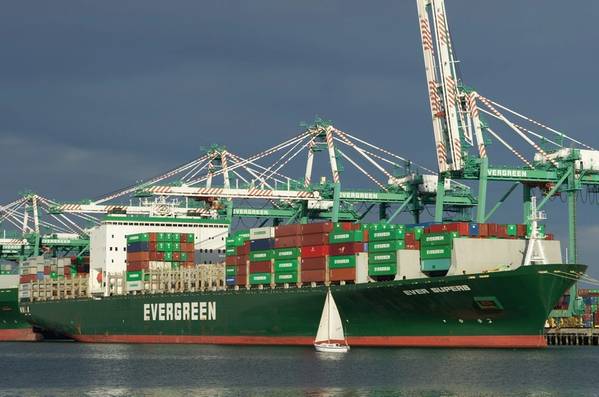
America's top container ports Los Angeles and Long Beach are cracking down on ocean carriers whose containers linger on terminals as clogged U.S. seaports struggle to keep up with record box volumes.
Under the new policy, developed in coordination with the Biden-Harris Supply Chain Disruptions Task Force, U.S. Department of Transportation and multiple supply chain stakeholders, and set to take effect November 1, the ports will charge ocean carriers for each truck-bound container dwelling nine days or more and rail containers that sit for three days or more. Fees will start at $100 per container, increasing in $100 increments per container per day.
Before the pandemic-induced import surge began in mid-2020, on average, containers for local delivery sat on container terminals under four days, while containers destined for trains dwelled less than two days. Those numbers have increased significantly, making it difficult to clear cargo off the terminals and bring in ships at anchor.
“We must expedite the movement of cargo through the ports to work down the number of ships at anchor,” said Port of Los Angeles Executive Director Gene Seroka. “Approximately 40% of the containers on our terminals today fall into the two categories. If we can clear this idling cargo, we’ll have much more space on our terminals to accept empties, handle exports, and improve fluidity for the wide range of cargo owners who utilize our ports.”
“With the escalating backlog of ships off the coast, we must take immediate action to prompt the rapid removal of containers from our marine terminals,” said Port of Long Beach Executive Director Mario Cordero. “The terminals are running out of space, and this will make room for the containers sitting on those ships at anchor.”
“I support the actions taken by the ports of Los Angeles and Long Beach today to charge ocean carriers for lingering containers on marine terminals. These actions aim to expedite the movement of goods and reduce congestion in our ports,” said John D. Porcari, Port Envoy to the Biden-Harris Supply Chain Disruptions Task Force. “As our economy continues to grow, increased demand and disruptions caused by the pandemic are putting our supply chains to the test. While we’ve seen new records set in terms of throughput this year at West Coast ports, we need more players throughout the supply chain to keep stepping up. The federal government will continue to bring together private companies and stakeholders from across the supply chain and serve as an honest broker helping to surface solutions like this to address supply chain disruptions.”
The ports said fees collected from dwelling cargo will be re-invested for programs designed to enhance efficiency, accelerate cargo velocity and address congestion impacts throughout the San Pedro Bay.
Dr. Johannes Schlingmeier, Cofounder and CEO, Container xChange, said, “While the underlying principle of this measure reflects initiative on the part of the ports, we believe that there are many layers to this problem which will need attention from all decision makers and stakeholders. It is important to reflect on the problem of the record volume and congestion problem at these ports and identify who could possibly play a key role in reducing the congestion. The intermodal stakeholders like the truckers and rail transport play a vital role in delivering the boxes on time. As much as they are important to the situation, they are beyond the capacity and control of the carriers and these charges to the carriers will likely not increase trucking supply.
“What we foresee resulting from this decision is an added burden passed on to the shippers from the ocean carriers who are the customers of the carriers. Hence, there will be limited impact of this measure on the improvement of cargo movement and congestion at the LA and LB ports if we look at it in isolation.”




